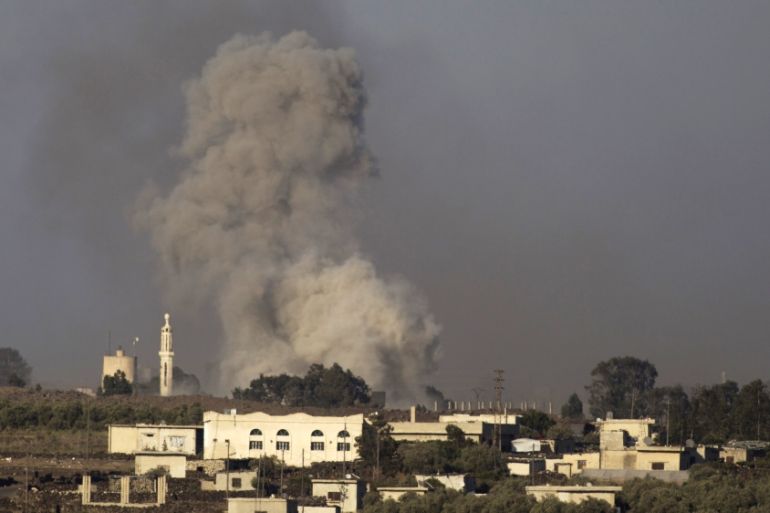Russia: Iran-backed forces withdraw from Golan frontier
Israel deems such a pullback to be insufficient as it insists forces controlled by Iran should leave Syria entirely.

Iran-backed forces have withdrawn their heavy weapons in Syria to a distance of 85km from the Israeli-occupied Golan Heights, but Israel has deemed the pullback inadequate.
“The Iranians withdrew and the [Shia] formations are not there,” TASS Russian news agency quoted Alexander Lavrentiev, President Vladimir Putin‘s special envoy to Syria as saying on Wednesday.
Lavrentiev said Iranian service personnel whom he described as advisors could be among Syrian army forces who remain closer to the Israeli border.
“But there are no units of heavy equipment and weapons that could pose a threat to Israel at a distance of 85km from the line of demarcation,” Lavrentiev said.
He did not elaborate on when the agreement was forged or for how long.
“The agreement is still in effect. Iranian forces have actually been withdrawn from [the southern de-escalation zone in Syria] in order not to irritate the Israeli administration, which has increased the number of attacks on Iranian sites in this territory,” Lavrentyev said.
Russia has sought to reassure Israel by saying it wants only Syrian forces to deploy on or near the Syrian-held Golan. Israel, however, insists that forces controlled by Iran, which Israel deems its primary rival, exit Syria entirely now the civil war there is ending.
|
|
Russian-backed Syrian forces regained full control of the frontier on Monday after a six-week offensive in the area that expelled Syrian armed opposition and an affiliate of ISIL (the Islamic State of Iraq and the Levant, also known as ISIS) that had been deployed along the frontier with the Golan.
Israel has escalated its attacks against targets inside Syria suspected of being linked to Iran, insisting that it will not allow Iran to establish a permanent military presence near the frontier.
‘No compromises nor concessions’
An Israeli official deemed such a pullback to be insufficient.
“What we have laid down as a red line is military intervention and entrenchment by Iran in Syria, and not necessarily on our border,” Regional Cooperation Minister Tzachi Hanegbi told Israel Radio, citing the longer-range threat posed by Iranian missiles or drones positioned in Syria.
“There’ll be no compromises nor concessions on this matter.”
Last week an Israeli official, who spoke on condition of anonymity, said Russia had offered to keep Iranian forces at least 100km from the Golan Heights ceasefire line.
Israel rejected the offer, which was made during a meeting between Prime Minister Benjamin Netanyahu and visiting Russian Foreign Minister Sergey Lavrov.
In an apparent riposte, Russia’s ambassador to Israel, Anatoly Viktorov, said on Monday that Moscow could not compel Iran to leave Syria.
|
|
But Viktorov also signalled that Russia would continue to turn a blind eye to Israeli air raids against suspected Iranian and Hezbollah arms transfers or emplacements in Syria.
Hanegbi said Israel wanted to prevent Iran and Hezbollah from effectively extending their Lebanese front against it.
“We are not ready to see a new Hezbollah front on our northern border between Israel and Syria. This is something that is dangerous. This is something that, if we don’t prevent it today, when still at its outset, will exact a heavy price of us down the line,” he said.
Iran has military advisers in Syria and backs Shia militias fighting alongside Syrian troops, including Lebanon‘s Hezbollah.
Israel occupied the Golan Heights in the 1967 Middle East war. The frontier was quiet for decades following a 1974 disengagement agreement.
With the start of Syria’s war in 2011, fighting erupted along the frontier, bringing rebels to the area.
In 2014, a UN peacekeeping force deployed along the disengagement lines withdrew when rebels took control of the frontier.